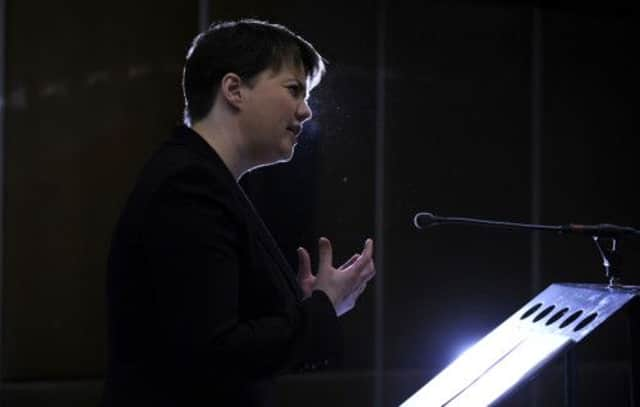Leaders: Tories must unite around Davidson


To produce a policy that reflects the nation’s broad spectrum of opinion, Scotland needs a strong party that unequivocally represents a centre-right point of view. Davidson has pledged to make the Scottish Tories a party that once again can lay claim to the many Scots who are – by outlook, if not by traditional party allegiance – natural conservatives. But if she is to have any chance of doing so, her party has to be united behind both her and her policy programme. And the fractious, almost mutinous atmosphere within the Scottish Tories at the moment suggests she is some way away – to say the least – from winning such backing.
Tories should need no lessons in the electoral cost of division. A glance at the UK party’s internal strife over Europe over the past 25 years – and especially the string of no-hope right-wing UK leaders those arguments produced during the Blair era –should be a stern enough lesson in political realities. A parallel argument over the Scottish constitution could, if allowed to become entrenched, cause similar electoral damage. Make no mistake, the constitution is the key issue here. Grumblings from Tory MSPs about Davidson’s performance at First Minister’s Questions may have some justification on occasion but are irrelevant in the broader scheme – only political anoraks watch FMQs. Their grumbling over having to effectively re-apply for their own jobs as Davidson seeks to bring fresh blood into the Holyrood group is just self-interested bleating. Anxiety in some quarters about Davidson’s liberal stance on issues such as gay marriage reflects a calamitous desire on the part of some Tories to steer the party into a cul de sac of small-minded, small-town moral censoriousness.
Advertisement
Hide AdAdvertisement
Hide AdIt would be disastrous for the Scottish Tories if they were to act on the warnings of Lord Forsyth, who has urged Davidson not to back the campaign for more powers for Holyrood. The former Scottish Secretary is one of the most talented politicians of his generation, his skill insufficiently acknowledged north of the Border. But, on this occasion, his resistance to further devolution of powers risks condemning the Scottish party to even more years in the wilderness, and quite possibly oblivion. Forsyth’s dismay is understandable – after all, he backed Davidson in the leadership contest precisely because she had drawn “a line in the sand” on greater home rule. Davidson’s volte face on home rule is now a done deal, and should be fretted over no more. The new position is far more in keeping with core Tory values of self-sufficiency and accountability. In 2013 these rightly trump a somewhat stale and dogmatic adherence to inflexible last-ditch unionism.
Those Tories who are enthusiasts for further devolution also need to get behind Davidson. Although they have anxieties about how far she will run with this project, they should accept with better grace that she is moving in their favoured direction of travel, with the Prime Minister in full agreement about the need for more powers. Instead of trying to undermine her, they need to bolster her support as she tries to fend of those who are in agreement with Forsyth.
Talk in Tory circles about replacing Davidson is tantamount to a death wish. The party must unite around Davidson and the push for more powers if it is to have any hope of a better future.
Tax the bags
A tax on plastic shopping bags is now an accepted part of normal life in Wales, in Northern Ireland and many other places around the world, and generally regarded as a positive contribution to the constant battle against litter and pollution. And that is before one factors in the danger stray plastic bags pose to wildlife, and the problems posed by their stubbornly non-biodegradable composition. Yet despite early enthusiasm from SNP ministers and a consultation process that ended nine months ago, there has been no indication that the Scottish Government is minded to make the levy a reality.
Of course, in a consultation all views must be considered, and there was indeed substantial resistance from some business groups about the idea. But strong government is about looking beyond the special pleading of vested interest groups and deciding what is in the broader public interest. Some of the objections about a risk to inward investment were fanciful.
This levy is a sound idea, tried and tested elsewhere, and would be a progressive step toward Scotland being a country that was tidier and more in tune with environmental concerns. The Scottish Government needs to make its intentions clear. If it intends to push forward with this policy, it should do so with no further ado. If not, it must publicly justify its refusal.